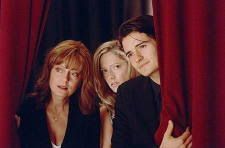John Cusack needs Ione Skye to help him Say Anything....
Tom Cruise says "hello", and more, to Renee Zellwegger in Jerry Maguire.
And charms Penelope Cruz in Vanilla Sky.
Patrick Fugit manages to deal with his life after he encounters Kate Hudson in Almost Famous.
Thus, is it surprising that Orlando Bloom feels alive after he meets and gets guidance from Kirsten Dunst in Elizabethtown?
No, it is not, and the same answer can be given to a question: Is the similar theme of boy-meets-girl-who-change-his-life worth revisiting?
After more than a decade of playing on the familiar field, it is apparent that Crowe has grown tiresome of coming up with refreshing takes on the stated theme. Worse, on the film, we are given extra task to define if the film can be considered as a road-trip film about defining life after string of failures, or half-baked romance? The task has to be completed while enduring the length of the film that goes more than 2 hours, yet it seems like a lifetime before we finally see the credits title.

Thankfully, Susan Sarandon proves to be a saving grace despite the deadpanned expression of Bloom and the inexplicably wasted quirky style of Dunst. In accordance to matriarch style of Frances McDormand in Almost Famous, Sarandon carries the similar role in her own bravura that leaves us wanting for more. In fact, her stage-act should be the closing scene of the film, which surely will leave audience smiling, remembering her relieving comic presence.
Yet, Crowe chooses to allies with American Tourism Board (if such an organization exists) to blatanly depicts how a road trip in the USA should be taken.
We don't bother anymore.

No comments:
Post a Comment